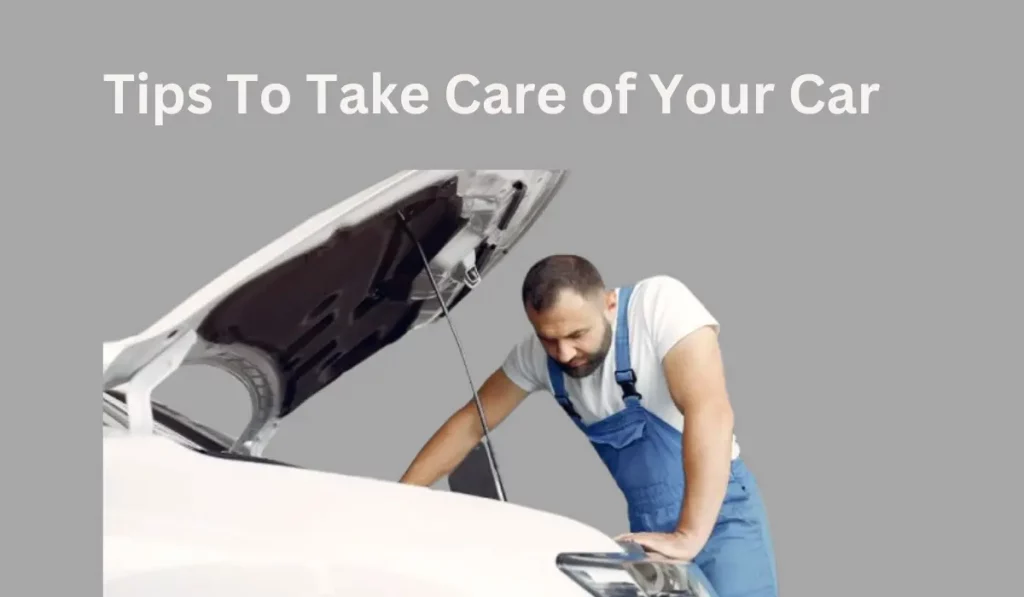Owning a car comes with the responsibility of proper maintenance to ensure its longevity, reliability, safety, and performance. Neglecting regular upkeep can lead to costly repairs and compromise your vehicle’s performance. Fortunately, by following some simple tips, you can keep your car in top-notch condition for years to come. Here are essential tips to take care of your car.
Let’s jump into the deep:
Essential Tips to Take Care of Your Car
Regular Wash and Wax:
Keeping your vehicle clean isn’t just about appearances; it also helps preserve its exterior and prevent rust and corrosion. Wash your car regularly, especially during winter months or after driving on salted roads, to remove dirt, grime, and corrosive substances. Applying a coat of wax every few months provides an additional layer of protection against the elements.
Regular Oil Changes:
One of the most crucial aspects of vehicle maintenance is regular oil changes. Engine oil lubricates moving parts, reduces friction, and prevents overheating. Check your owner’s manual for the recommended oil change interval, typically every 5,000 to 7,500 miles, and stick to it diligently. Using the right type and grade of oil is equally important for optimal engine performance.
Check Battery
Checking your vehicle’s battery is an important aspect of maintenance, as it ensures your car starts reliably and prevents unexpected breakdowns.
Before checking the battery, ensure your vehicle is turned off and parked on a flat surface. Wear gloves and eye protection to protect yourself from battery acid and other contaminants.
If the battery is discharged but still in good condition, recharge it using a battery charger. Follow the charger manufacturer’s instructions for the proper charging procedure. If the battery is old, weak, or fails the load test, it’s advisable to replace it with a new one to avoid potential starting problems.
By regularly checking and maintaining your vehicle’s battery, you can ensure reliable starting performance and avoid being stranded due to a dead battery. If you’re unsure about testing or replacing the battery yourself, consult a professional mechanic for assistance.
Keep Tires Inflated and Rotated:
Proper tire maintenance not only improves fuel efficiency but also enhances safety and handling. Check tire pressure monthly and inflate them to the manufacturer’s recommended PSI (pounds per square inch). Additionally, rotate your tires every 6,000 to 8,000 miles to ensure even wear and prolong their lifespan. Balding or unevenly worn tires should be replaced promptly to avoid safety hazards.
Regular Fluid Checks:
Your vehicle relies on various fluids to operate smoothly, including coolant, brake fluid, transmission fluid, and power steering fluid. Regularly check these fluids according to the manufacturer’s recommendations and top them off when necessary. Low fluid levels can lead to overheating, brake failure, or transmission issues, so staying vigilant is crucial.
Replace Air Filters:
Clean air filters are essential for maintaining good engine performance and fuel efficiency. Check your air filter regularly, and replace it every 12 months or 12,000 miles, or sooner if you frequently drive in dusty or polluted environments. A clogged air filter restricts airflow to the engine, leading to reduced power and increased fuel consumption.
Brake Maintenance:
Brakes are a critical safety component of your vehicle. Have your brakes inspected regularly, and replace brake pads and rotors as needed. Signs of brake wear include squeaking or grinding noises, pulsation or vibration when braking, and a longer stopping distance. Ignoring these signs can compromise your safety on the road.
Check Spark Plug
Spark plugs play a vital role in the combustion process of your vehicle’s engine. They ignite the air-fuel mixture, creating the combustion necessary to power the engine. Over time, spark plugs can wear out, leading to misfires, rough idling, decreased fuel efficiency, and even engine damage if left unaddressed.
checking and maintaining spark plugs are essential aspects of vehicle maintenance that contribute to optimal engine performance, fuel efficiency, and reliability. By inspecting and replacing spark plugs at the appropriate intervals, you can prevent potential engine problems and ensure your vehicle continues to run smoothly for miles to come.
Change Windshield Wipers
Changing windshield wipers is a simple yet essential maintenance task that can greatly improve visibility and safety while driving, especially during inclement weather.
Before starting the replacement process, make sure you have the correct size and type of wiper blades for your vehicle. You can find this information in your vehicle’s owner’s manual or by consulting an auto parts store.
Check your windshield wipers regularly for signs of wear, such as cracking, splitting, or reduced flexibility. Replace them as needed, typically every six months to a year, or sooner if they are not performing effectively.
Follow Maintenance Schedule:
Your vehicle’s owner’s manual contains a detailed maintenance schedule outlining when specific services are due. Adhering to this schedule is crucial for ensuring optimal performance and preventing costly repairs down the road. From tune-ups to belt replacements, following the manufacturer’s recommendations will keep your vehicle running smoothly.
Also Read
Importance of Regular Car Maintenance
Regular car maintenance is essential for safety, reliability, longevity, fuel efficiency, performance, resale value, and compliance with regulations. Investing time and resources in maintaining your vehicle pays off in the form of a safer, more reliable, and more efficient driving experience. It also helps protect your investment by preserving the value of your car over time.
Regular car maintenance is of utmost importance for several reasons:
Safety:
Regular maintenance helps ensure that your vehicle operates safely on the road. It includes checking crucial components such as brakes, tires, steering, and lights to ensure they are functioning correctly. Addressing any issues promptly reduces the risk of accidents caused by mechanical failures.
Reliability:
Proper maintenance enhances the reliability of your vehicle by reducing the likelihood of unexpected breakdowns. Routine checks and servicing identify potential problems early, allowing them to be addressed before they escalate into major issues that leave you stranded on the side of the road.
Longevity:
Just like any machine, cars require regular care to perform optimally and last longer. Regular oil changes, fluid checks, and part replacements help prevent wear and tear, prolonging the lifespan of your vehicle. A well-maintained car retains its value better over time.
Fuel Efficiency:
Regular maintenance, such as keeping tires properly inflated, replacing air filters, and tuning the engine, contributes to improved fuel efficiency. A well-tuned engine and properly maintained components consume less fuel, saving you money at the pump and reducing your environmental footprint.
Performance:
Maintaining your car according to the manufacturer’s recommendations ensures it performs at its best. This includes maintaining engine performance, smooth transmission shifts, and responsive braking. Regular servicing helps identify and address any issues that may affect your vehicle’s performance.
Resale Value:
A well-maintained car with a documented service history commands a higher resale value. Prospective buyers are more likely to pay a premium for a vehicle that has been consistently cared for and serviced regularly, as it gives them confidence in its reliability and condition.
Compliance:
Regular maintenance helps ensure your vehicle remains compliant with local regulations and safety standards. Some jurisdictions require periodic inspections to ensure vehicles meet safety and emissions standards. Keeping your car properly maintained ensures it meets these requirements.
End Words
Regular maintenance is the key to keeping your vehicle running smoothly, efficiently, and safely for years to come. By following these essential tips, you can avoid costly repairs, improve fuel efficiency, and ensure a comfortable and reliable driving experience. Remember, a well-maintained vehicle not only performs better but also retains its value over time. So, invest the time and effort in taking care of your ride, and it will reward you with miles of trouble-free driving.





